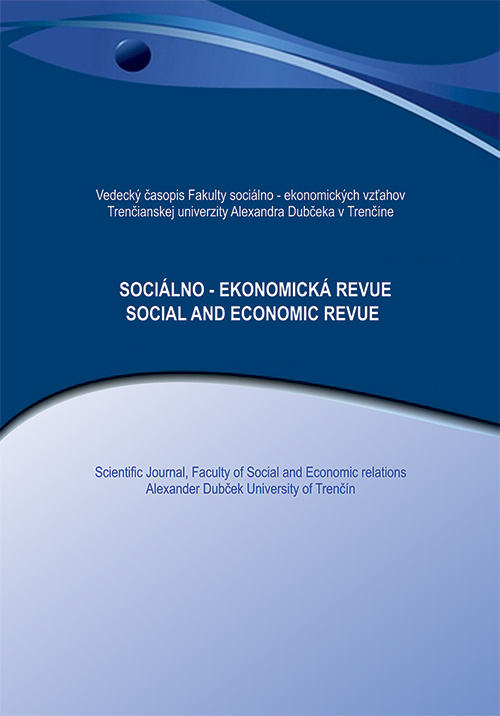THE QUALITY OF BUSINESS ENVIRONMENT AND UNIVERSITY STUDENT ENTREPRENEURSHIP - COMPARISON OF THE CZECH AND THE SLOVAK REPUBLIC
The aim of this paper was to define and quantify significant factors that potentially influence university students’ propensity for entrepreneurship. A part of this aim was a comparison of defined factors in the Czech and the Slovak Republic. A survey-based research was conducted with university students in the Czech Republic and Slovakia. 409 students in the Czech Republic and 568 students in Slovakia were approached during this research. To verify the defined scientific hypotheses, two custom Indexes were created: the Business environment Index and the Propensity for Entrepreneurship Index. The research results brought interesting findings. Even though the aggregated Business environment Index proved to be lower in Slovakia than in the Czech Republic, Slovak students’ determination to run a business is higher. The evaluation of respective constructs was quite similar. Students in both countries gave the advantages of entrepreneurship and the quality of education a similar rating. In Slovakia, the third most important construct was Access to financial resources, and in the Czech Republic, it was the Quality of the macroeconomic environment. According to Slovak students, the most significant factors determining the quality of the business environment and the propensity for entrepreneurship are: business allowing them to fully utilize their own skills, a better career growth and interesting job possibilities, as well as financial support from the state. Similarly, Czech students positively assessed the possibility of utilizing their skills, and gave the quality of university education in the context of entrepreneurial activities a very positive rating. Students in Slovakia view the state’s role in establishing business environment as a significantly negative factor. The students in the Czech Republic view media’s attitude towards entrepreneurs as very negative. This research has its limitations, but it has brought interesting findings and a possible inspiration for further research aimed at university students’ propensity for entrepreneurship.
Vydanie: 2017/3 Strany: 34-43 Klasifikácia JEL: A20, I25, I26
DOI:
Kľúčové slová: university students, factors influencing entrepreneurship, propensity for entrepreneurship
Sekcia: SOCIAL CONTEXT OF THE ECONOMY, LABOR MARKET AND HUMAN RESOURCES DEVELOPMENT
Kontakty:
Jaroslav Belás, prof. Ing. PhD.
Faculty of Management and Economics,
Tomas Bata University in Zlín
Mostní 5139, 760 01 Zlín,
email: belas111@gmail.com
Martin Čepel, Dr. Ph.D MBA
LIGS University LLC Honolulu
Richards Street, Suite 836, Hawaii,
email: cepel@benzinol.com
Gabriela Sopková, JUDr. Ing. PhD.
Faculty of Commerce,
University of Economics Bratislava
Dolnozemská cesta 1, 852 35 Bratislava,
email: gabika.sopkova@gmail.com
Anna Kotásková, Ing.
Faculty of Economics and Business,
Paneuropean University in Bratislava
Tematínska 10, 851 05 Bratislava,
email: anna.kotaskova@gmail.com
Literatúra:
Belás, J., Vojtovič, S., Ključnikov, A. (2016). Microenterprises and Significant Risk Factors in Loan Process, Economics and Sociology, Vol. 9, No 1, pp. 43-59.
Bedzsula, B., Köves, J. (2016). Quality Improvement Based on a Process Management Approach, with a Focus on University Student Satisfaction, Acta Polytechnica Hungarica, Vol. 13, No. 6, pp. 87-106.
BusinessInfo.cz. (2015). Čtyři z pěti studentů si přivydělávají. Polovina zvažuje podnikání. [on-line] [cit. 2016-07-25]. Retrieved from:: http://www.businessinfo.cz/cs/clanky/ctyri-z-peti-studentu-si-privydelavaji-polovina-zvazuje-podnikani-64985.html
Conorto, R. a kol. (2014). Analýza, monitor kvality podnikateľského prostredia v SR a konkurencie schopnosť ekonomiky. Bratislava: Centrum vzdelávania MPSVR SR.
Delgado-Márquez, B. L., Aragón-Correa, J. A., Cordón-Pozo, E., Pedauga. L. E. (2016). Trust when financial implications are not the aim: the integration of sustainability into management education, Journal of Business Economics and Management, Vol. 17, No. 6, pp. 1172-1188.
Dugan, E. (2015). The effect of enterepreneurship education on entrepreneurial intentions of univesity students in Turkey. Ekonometri ve İstatistik Sayı (Istanbul University Econometrics and Statistics e-Journal): 23: 79-93.
Dutta, D. K., Li, L., Merenda, M. (2011). Fostering entrepreneurship: Impact of specialization and diversity in education, International Entrepreneurship Management Journal, Vol.7, Issue 2, pp.163-179.
Farhangmehr, M., Gonçalves, P., Sarmento, M. (2016). Predicting entrepreneurial motivation among university students: The role of entrepreneurship education, Education+Training, Vol. 58, No. 7/8, pp. 861-881.
Flešková, M., Babiaková, B., Nedelová, G. (2011). Preferencie vysokoškolských študentov v profesionálnom živote a ich predstavy o vlastnom podnikaní, E + M Ekonomie a management, 1:97-111.
FinExpert (2015). Zájem o podnikání roste, zejména mezi mladými lidmi. [on-line] [cit. 2016-07-25]. Retrieved from: http://finexpert.e15.cz/zajem-o-podnikani-roste-zejmena-mezi-mladymi-lidmi
Chaudhary, R. (2017). Demographic factors, personality and entrepreneurial inclination: A study among Indian university students, Education+Training, No. 59, No. 2, pp. 171-187.
Kuratko, D. F., Hodgetts, R. M. (2004). Entrepreneurship: Theory, process and practice (6th edition). Mason, OH: Thomson/SouthWestern Publishing.
Ključnikov, A., Belás, J., Kozubíková, L., Paseková, P. (2016). The Entrepreneurial Perception of SME Business Environment Quality in the Czech Republic, Journal of Competitiveness, Vo. 8, Issue 1, pp. 66-78.
Lafuente, E. M. and Vaillant, Y. (2013). Age Driven Influence of Role-Models on Entrepreneurship in a Transition Economy, Journal of Small Business and Enterprise Development, Vol. 20(1), pp. 181-203.
Millian, J. M., Congregado, E., Roman, C., Van Praag, M., Van Stel, A. (2014). The Value of an Educated Population for an Individual’s Entrepreneurship Success, Journal of Business Venturing, Vol. 29, pp. 312-632.
Naude, W., Gries, T., Wood, E., Meintjiess, A. (2008). Regional determinants of Entrepreneurial Startups in a Developing Country, Entrepreneurship and Regional Development, Vol. 20, pp. 111-124.
Palalić, R., Ramadani, V., Đilović, A., Dizdarević, A., Ratten, V. (2017). Entrepreneurial intentions of university students: a case-based study, Journal of Enterprising Communities: People and Places in the Global Economy. https://doi.org/10.1108/JEC-12-2016-0046
Pruett, M., Shinner, R., Toney, B., Llopis, F., Fox, J. (2009). Explaining entrepreneurial intentions of university students: A cross cultural study, International Journal of Entrepreneurial behavior and Research, Vol. 15(6). pp. 571-574.
Rauch, A., Rijsdijk, S. A. (2013). The Effects of General and Specific Human Capital on long-Term Growth and Failure of Newly Founded Businesses, Entrepreneurship Theory and Practice, Vol. 37(4), pp. 923-941.
Sesen, H. (2013). Personality or environment? A comprehensive study on the entrepreneurial intentions of university students, Education+Training, Vol. 55, No. 7, pp. 624-640.
Shirokova, G., Osiyevskyy, O., Bogatyreva, K. (2016). Exploring the intention–behavior link in student entrepreneurship: Moderating effects of individual and environmental characteristics, European Management Journal, Vol. 34. No. 4, pp. 386-399.
Van der Sluis, J., Van Praag, M. (2008). Education and Entrepreneurship Selection and Performance: A Review of the Empirical Literature, Journal of Economic Surveys, Vol. 22(5), pp. 795-841.
Velez, C. M. (2009). The Probability of Transition to Entrepreneurship Revisited: Wealth, Education and Age, Annals of Finance, Vol. 5, pp. 421-441.
Wang, C. K., Wong, O. K. (2004). Entrepreneurial interests of university students in Singapore. Technovation, Vol. 24, pp. 163-172.
Zollo, L., Laudano, M. C., Ciappei, C., Zampi, V. (2017). Factors affecting universities’ ability to foster students’ entrepreneurial behaviour: An empirical investigation, Journal of Management Development, Vol. 36, No. 2, pp. 285-297.


